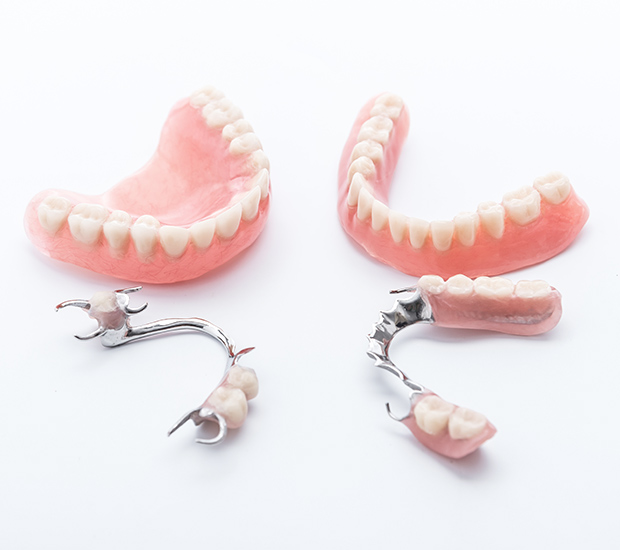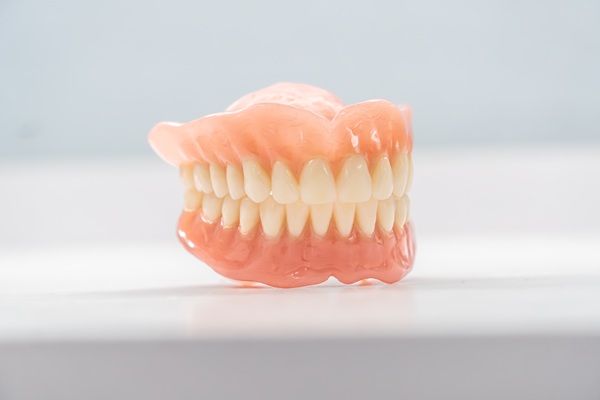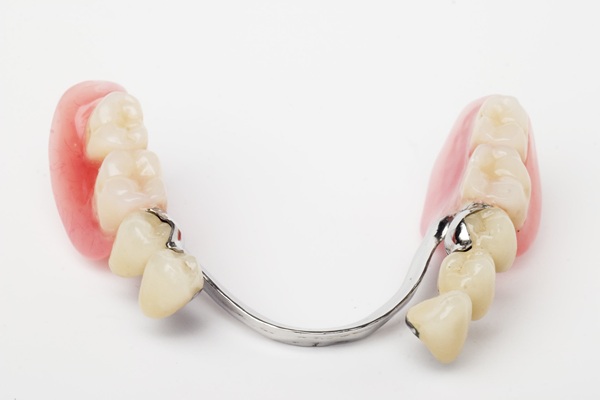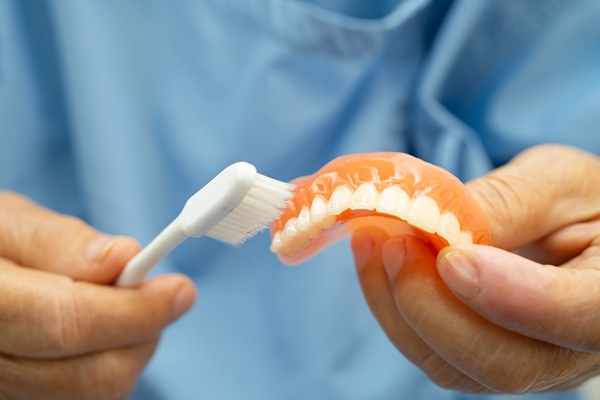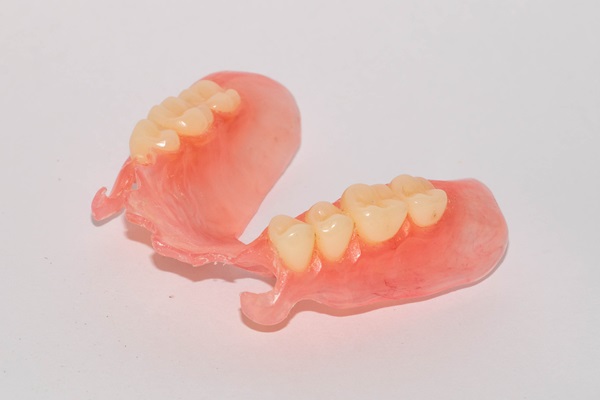Dentures and Partial Dentures Sun City West, AZ
No matter the reason for tooth loss in adults, we can use dentures to provide an effective and natural-looking replacement. With our dentures, you will be able to eat and speak as you usually would. We offer full and partial dentures that we will customize to your needs. Dentures and partial dentures are artificial teeth that can replace an entire row of teeth or all teeth in a mouth.
Dentures and partial dentures are available at Lameh's Denture Center in Sun City West and the surrounding area. Along with helping patients chew and speak without issue, dentures can also help create the appearance of a full smile again. With our help, you can obtain a set of functioning teeth and restore your smile.
Call us today at (623) 263-7966 and schedule a time to discuss replacing your teeth with dentures or partial dentures.
Reasons to Get Dentures
While there are other options available, there are several reasons that so many people turn to dentures:
- Denture may be an affordable solution to tooth loss. Other tooth replacement options tend to cost more, contingent upon the insurance provider. Traditional full dentures and partial dentures are typically more cost-efficient than alternatives. This is true even when factoring in the cost of replacing the dentures every 5-10 years.
- Lower risk associated with denture procedure. The patient prefers to avoid the potentially painful failure risk associated with bridges. Dental implants also require more invasive surgery, by nature making them riskier. Age and potential bone loss can increase risk.
- Denture can be received relatively quickly. Dentures typically take less time to receive than implants. Dental implants may take a year or more to complete. Healing periods between steps may last for up to six months.
Check out what others are saying about our denture and partial denture services on Yelp: Dentures and Partial Dentures Sun City West
How Dentures Are Made
Dentures consist of a flesh-colored base and the synthetic teeth attached to it. Today, both components are made of a type of acrylic. The artificial teeth are typically made of acrylic resin, which closely approximates the appearance of real teeth.
Once the decision is made to proceed with dentures, the patient will make an appointment for the impression. The dentist will put a tray with a thick paste into the patient's mouth to take impressions of the upper and lower teeth. This process usually takes about 20 seconds for each impression. The dentist may offer to apply a numbing agent to the palate beforehand to minimize discomfort.
Afterward, the impressions are used to make a plaster model of the mouth. The dental lab technician then uses wax to attach the teeth. The wax is shaped and trimmed according to the patient's gum shape.
Then the wax shape with attached teeth is placed in a container, sometimes called a flask. Dental stone or plaster is poured around to hold it. The wax is then boiled out, leaving a molding in the shape of the gums, and the acrylic material for the dentures' base is poured in.
The denture is removed from the container, trimmed and polished. At this point, the patient will have the first fitting. While some people may find their dentures fit properly right away, most need to have a few adjustments done for optimal comfort.
It is normal to need several fitting appointments before the dentures fit the way they should. Patients should not hesitate to let the dentist know if something feels wrong. What may seem like a trivial amount of discomfort during fitting can seriously interfere with your quality of life, later on, so be sure to speak up.
Types of Dentures
There are several basic types of dentures. The right option for you can depend on several factors, which Lameh's Denture Center can discuss with you. Choosing an option that works for you can help you get the most out of the dentures.
Dentures can be full or partial. A full set can be necessary for patients who are missing all their teeth. In this case, impressions will be taken of the gums and the teeth made to maintain the proportions and distances similar to the real teeth. A partial set can be an option if the patient still has several teeth in good condition remaining.
Additionally, there are also fully removable and bridge-supported dentures. Removable dentures are what most people picture: the base that sits on the gums with attached teeth. They can be easily taken out. While this option is typically more affordable, removable dentures may need several adjustments over the years as the mouth's shape changes.
Bridge-supported dentures are also removable but do not have a base. They are clipped on to four or six dental implants. These implants are small titanium posts that are surgically inserted into the jawbone. Eventually, the implants fuse with the bone.
Due to the implants, bridge-supported dentures tend to be more costly than other options. They also involve minor surgery. However, many people find they feel more secure and are more comfortable because they do not need a base. The implant procedure can also reduce future bone loss, which can be familiar with missing teeth.
Not all patients are good candidates for fixed dentures. Those who already suffer extensive bone loss may not have enough bone to support the implants. Some other health concerns can also prevent implants from being a good option.
Options Other Than Dentures and Partial Dentures
Dentures have been improved in design for over a hundred years. Today they are a viable option for patients of all ages, whether one tooth needs to be replaced or many. At Lameh's Denture Center, we can advise patients on when this treatment would suit their oral health needs. At our office, we can also advise you on other options for replacing missing teeth. Each type of tooth replacement has distinguishing qualities. There are two primary categories of tooth replacement other than dentures:
- Dental implants. These are artificial teeth similar in look and feel to natural teeth. They have roots made with screws that are inserted into the jaw for stability. Implants are highly durable with the capacity to last a lifetime with proper care.
- Dental bridge. A bridge closes the space left by missing teeth; hence, why they are referred to as “bridges.” Bridges are held in place by either natural teeth or implants with artificial teeth bridging the space and two or more crowns placed over the teeth and connected to an artificial tooth.
Helping Dentures Last With Proper Care
Dentures can work effectively for up to 10 years. This time frame will depend mainly on the person’s commitment and diligence to maintaining the appliance. Just as patients should brush and floss natural teeth, people must do the same with dentures. These habits will help prevent and remove stains from artificial teeth, helping to preserve the color.
Each night, patients should remove the dentures and soak the appliance in a solution that we recommend to help clean the dentures. After every meal, the wearer should take out the dentures and rinse them off. When doing this, the person must be careful not to drop the appliance. It may be helpful to place a towel on the counter or in the sink.
Dentures should allow the person to eat most foods without any issues. However, the patient should be careful about chewing hard items such as candy, nuts, and ice. Sticky foods can also pull the dentures out of the person’s mouth. If the person notices any damage to the base or artificial teeth, they should contact our office right away.
People should not try to fix the dentures without professional assistance. An article on the American Dental Association website offers more information on the subject of maintaining dentures and what to do if the break. In all cases of the dentures sustaining damage, it is crucial to call us for repairs.
Common Myths and Misconceptions
One of the most common myths we hear about dentures is that once a patient gets their dentures created and placed, they are set for life. Remember that dentures typically last for 5-10 years. Since this is a wide span of years, patients may wonder how to know when they need new dentures. If the color has changed dramatically or there is physical damage, dentures may need replacement. The most telling sign, however, is when they no longer fit securely.
Some people may also believe that if they remove all their teeth and get full dentures, they’ll never need to set foot in a dentist’s office again. The truth is that dentists are in the best position to tell patients whether or not they need to get their dentures repaired or replaced. In fact, the dentist may adjust dentures during annual or bi-annual visits to keep them fitting correctly. Dentists also pay keen attention to gum health. If the patient smokes or suffers from illnesses that may affect the gums, this is even more important.
Questions Answered on This Page
Q. Are there different types of dentures?
Q. Are there dentures to replace a few of my teeth?
Q. What are the benefits of dentures?
People Also Ask
Q. How do I take care of my dentures?
Q. What do I do if I damage my dentures?
Q. What do I need to know about making adjustments to my dentures?
Definition of Denture Terminology
- Alveolar Bone
- The alveolar bone is the bone surrounding the root of the tooth that keeps the tooth in place.
- Clasp
- A clasp is a device that holds a removable partial denture prosthesis to the teeth.
- Denture Base
- The denture base is the part of the denture that connects the artificial teeth with the soft tissue of the gums.
- Edentulous
- Edentulous is a term that applies to people who do not have any teeth.
- Periodontal Disease
- Periodontal disease is a condition that causes inflammation of the gingival tissues and membrane of the teeth, leading to tooth loss without professional treatment.
- Pontic
- Pontic is another term for an artificial tooth on a fixed partial denture.
- Rebase
- Rebase is the process of refitting denture prosthesis by replacing the base material.
- Reline
- Reline is when a professional resurfaces the surface of the prosthesis with a new base material.
- Resin/Acrylic
- Resin and Acrylic are resinous materials that can be components in a denture base.
- Stomatitis
- Stomatitis is the inflammation of the tissue that is underlying a denture that does not fit properly. It can also result from other oral health factors.
Back to top of Artificial Teeth
